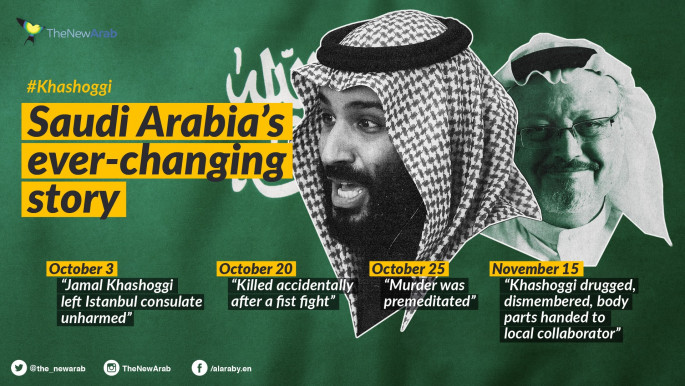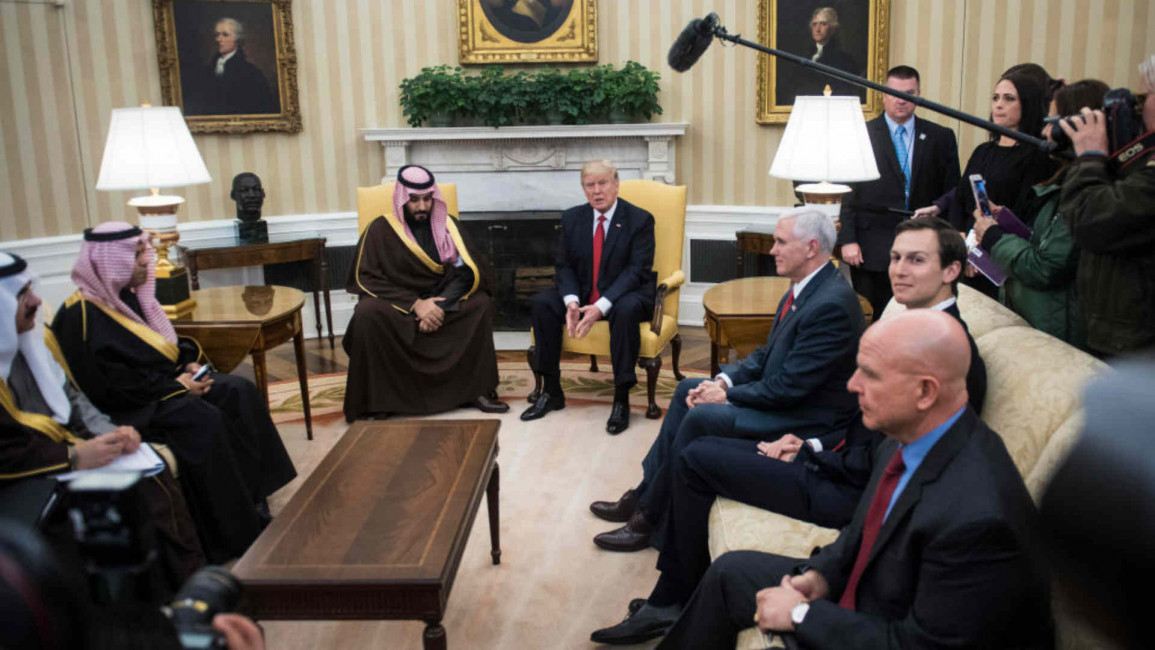Trump's Middle East adviser Jared Kushner and Saudi crown prince 'continued chatting' after Khashoggi murder
US Middle East envoy Jared Kushner broke White House protocol and continued to exchange personal messages with embattled Saudi Crown Prince Mohammed bin Salman even after the murder of journalist Jamal Khashoggi, The New York Times has claimed.
Kushner, who is the son-in-law of President Donald Trump, has remained a close of ally of the Saudi crown prince who faced widespread criticism for his alleged role in the disappearance of Khashoggi.
Personal dealings between the two continued despite the intervention of White House staff to end the informal relationship, wary that Kushner could be susceptible to Saudi manipulation.
"Inexperienced"
Kushner, effectively Trump's Middle East adviser, held no government posts before he was offered the position as envoy. He appeared ignorant on the basic pillars of Washington's policy in the region from the start, including a history of Saudi-US relations, the daily added.
"The inner circle is predominantly deal makers who lack familiarity with political customs and deep institutions, and they support Jared Kushner," a slide from a Saudi presentation on the incoming Trump administration read.
Saudi Arabia's Mohammed bin Salman's inner-circle soon attempted to woo Kushner, while at home the young royal broke with custom by elbowing out more senior princes to take the coveted crown prince title.
In Washington, Kushner helped organise a private dinner between Mohammed bin Salman, who was then just a prince, and Trump, following a last-minute cancellation by German Chancellor Angela Merkel.
 |
The relationship between Jared Kushner and Mohammed bin Salman constitutes the foundation of the Trump policy not just toward Saudi Arabia but toward the region. |  |
The prince was then treated with all the pomp and trappings usually reserved for heads of state, with photos of the meeting boosting the Saudi royal's standing on a global level, the report says.
"The relationship between Jared Kushner and Mohammed bin Salman constitutes the foundation of the Trump policy not just toward Saudi Arabia but toward the region," Martin Indyk, a fellow at the Council on Foreign Relations and a former Middle East envoy, told the Times.
Kushner's previous knowledge of the Middle East was shaped through his Israeli contacts, the daily alleges.
Enter the ambassador
UAE ambassador Yousef Otaiba was also keen to court the former businessman, after being introduced by Lebanese-American businessman Tom Barack who promised a relationship would be beneficial for both sides.
"Thanks to you, I am in constant contact with Jared and that has been extremely helpful,” Otaiba wrote to Barack shortly after Trump came to power.
Otaiba was also keen to play-up Mohammed bin Salman’s potential as a moderniser in Washington and soon Kushner and the Saudi crown prince struck a close relationship, addressing each other on first-name terms in messages and phone calls.
The relationship was further strengthened thanks to the role of UAE de-facto ruler Mohammed bin Zayed.
In 2016, top officials linked to Mohammed bin Salman visited New York where they met Kushner.
"Kushner made clear his lack of familiarity with the history of Saudi-American relations and he asked about its support for terrorism," the team is said to have noted.
 |
| [click to enlarge] |
"After the discussion, he expressed his satisfaction with what was explained about the Saudi role in fighting terrorism."
Saudi Arabia has played up its role in fighting al-Qaeda and Islamic State group-linked terrorism.
Saudi foreign policy has mostly concentrated on facing off Iran, Riyadh's key rival in the region, which has supported Shia militias in Syria, Iraq, Lebanon and Yemen - some designated as terrorist groups by the US.
In addition to offering help to Trump on a peace process between Israel and Palestine, the Saudi team has also offered support on seeing the president's election promise of "extreme vetting" for immigrants from some Muslim countries be put into practice.
The Saudi team allegedly offered help "establishing an intelligence and data" exchange "to help the American administration carry out its strategy of investigating those requesting residency (extreme vetting)".
Murder
Trump's team welcomed some of the suggestions, and in particular a joint centre to "fight the ideology of extremism and terrorism" and an "Arab-Islamic NATO" with thousands of troops "ready [to assist] when the president-elect wishes to deploy them".
Huge arms deals with the US - which have failed to materialise - were also offered by the Saudis as sweeteners, the Times added.
Secretary of State Rex Tillerson - who was forced out by Trump and recently the subject of abusive tweets by the president - is said to have resisted this close relationship between the US and Saudi Arabia.
Despite this, Kushner continued to promote Mohammed bin Salman in the White House, in the months after Trump took office.
"There was a risk the Saudis were playing him," one White House insider told the newspaper.
Trump moved closer to Mohammed bin Salman during and after a visit to Saudi Arabia shortly after he took office.
Following the murder of Khashoggi in October, Kushner and MbS continued to exchange messages despite the Saudi royal being under fire from all corners - except it appears, the White House - the NYT alleged.
Calls have been made from within the US political establishment for Trump to cut ties and spurn Prince Mohammed.
Trump has so far avoided sanctioning the crown prince for the murder and ignored the advice of the intelligence community, with MbS still at the helm of Saudi leadership.


![Morocco Israel [Getty] Morocco Israel [Getty]](/sites/default/files/styles/image_330x185/public/media/images/AE22E2B5-5046-42CE-AA20-F9869E5A1E9B.jpg?h=d1cb525d&itok=9YeA_Yk1)
